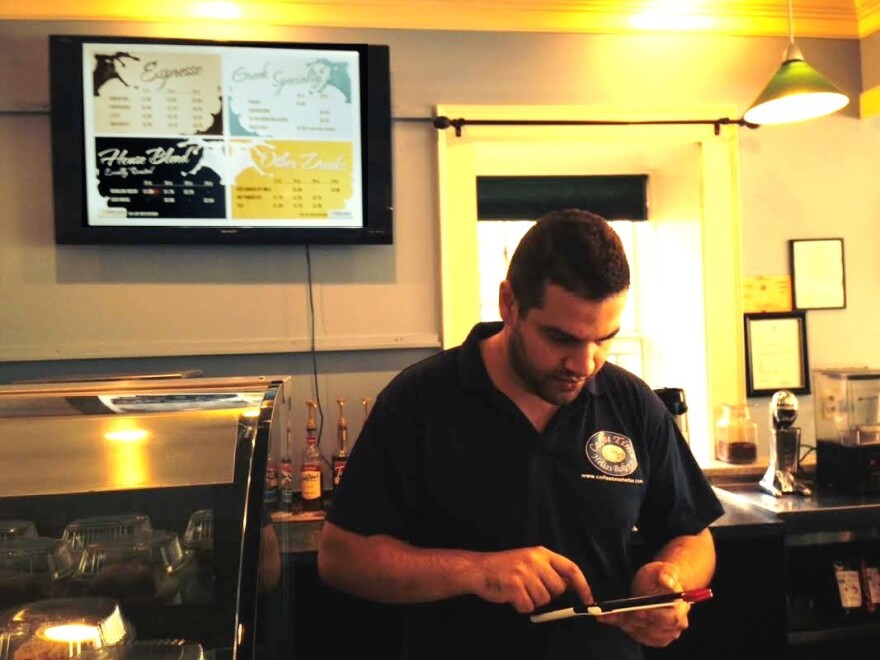A nationwide push to reduce bank card fraud is paving the way for consumers to use smartphone apps to purchase goods - Bitcoin is on the cutting edge of the "digital currency" revolution.
You've seen the headlines: Breach after breach of major retailer credit card security - and mounting criticism of the U.S. electronic payment system, has thrust the spotlight on digital currency - and apps for your smartphone or tablet that trump using a bank card to pay for purchases when it comes to safety and security.
Many stores no longer accept checks - some are reluctant to take cash, marking your legal tender with counterfeit banknote detection pens. The obvious way to pay going forward is an electronic one - but there are competing systems - Google Wallet, Apple Pay and a mobile payment platform still in testing called CurrentC, which despite being "not ready for prime time" has two major U.S. pharmacies - CVS and Rite-Aid, favoring it. Apple Pay worked at the drugstore chains and a host of other stores until retailers turned off their scanners. Fortune magazine explains there's a Walmart-led consortium, MCX - short for Merchant Customer Exchange, backing those square QR "quick response" codes instead of the NFC (near-field communications) system that Apple and Google use. CurrentC opens up the possibility for many digital currencies including Bitcoin.
Dave Ripley is Co-Founder and CEO of Glidera, a digital currency venture headquartered in Chicago. "The way Bitcoin works is that you effectively obtain a Bitcoin wallet, which is used to both store your Bitcoins and transfer Bitcoin to other individuals or companies or entities. After you get a wallet, the next thing you need to do is obtain some Bitcoins. There are many ways to do that. Right now in the U.S. there's a number of different exchanges and services that are beginning to emerge where you can actually buy Bitcoin."
One can buy Bitcoin in downtown Albany - home to the first Bitcoin ATM in New York, located at Paul Paterakis' Clinton Square coffee shop, CT@HB.

"A lot of folks are un-banked within the United States and in the world, in developing countries. And what Bitcoin does is it provides a way of global commerce without need of a bank."
It's as simple as downloading app to your smartphone or tablet.
[Bonus audio from Paul Paterkis, walking you through the process of obtaining your first Bitcoin.]
"People try to compare Bitcoin to PayPal, and there really isn't a comparison. PayPal uses our existing banking system and U.S. dollars, whereas Bitcoin has its own unit of account, and it's actually a peer-to-peer system, so it doesn't rely on a third party, so it's one person to another, through cryptography, which is a technology that encrypts the money transfer."
Dave Ripley says there are a number of merchants currently accepting Bitcoin, including "Dell.com, dish network, Expedia, CheapAir, Tiger Direct... There are starting to be some bricks and mortar businesses that accept Bitcoins as well."
Benjamin Lawksy, superintendent of financial services for the state of New York, has decided that New York will not require digital currency software developers to obtain a "BitLicense" to operate in the state. That removes a layer of red tape and paves the way for system advances.
Far from settled is the ongoing debate as to whether Bitcoin is a currency or a commodity. Or both. Again, Dave Ripley: "Commodities tend at some time to perform as currency or money. Probably the one most common place where we've seen this in history is gold. Gold being a commodity that at some points in time performed as a currency or some form of money. The fiat currencies, for example the dollar or euro, those of course are not commodities at all, they're debt instruments. They can perform and act as currency and money, given the direction of the governments that control them. Bitcoin is very similar to gold in that it has properties of a commodity, effectively is a commodity. In addition to being a commodity much the same as gold, it actually has very strong properties as a form of currency or money. As its usage grows as a medium of exchange, Bitcoin will grow into becoming used as a currency and taking on currency properties."

Launched in 2009, Bitcoin pre-dates both Apple Pay and Google Wallet. The internet-based, decentralized digital currency is currently worth about $350; Bitcoin prices have been extremely volatile - they've fallen as low as $275 and hovered around $1100 in December 2013. Bitcoin price resilience tumbled this week.









